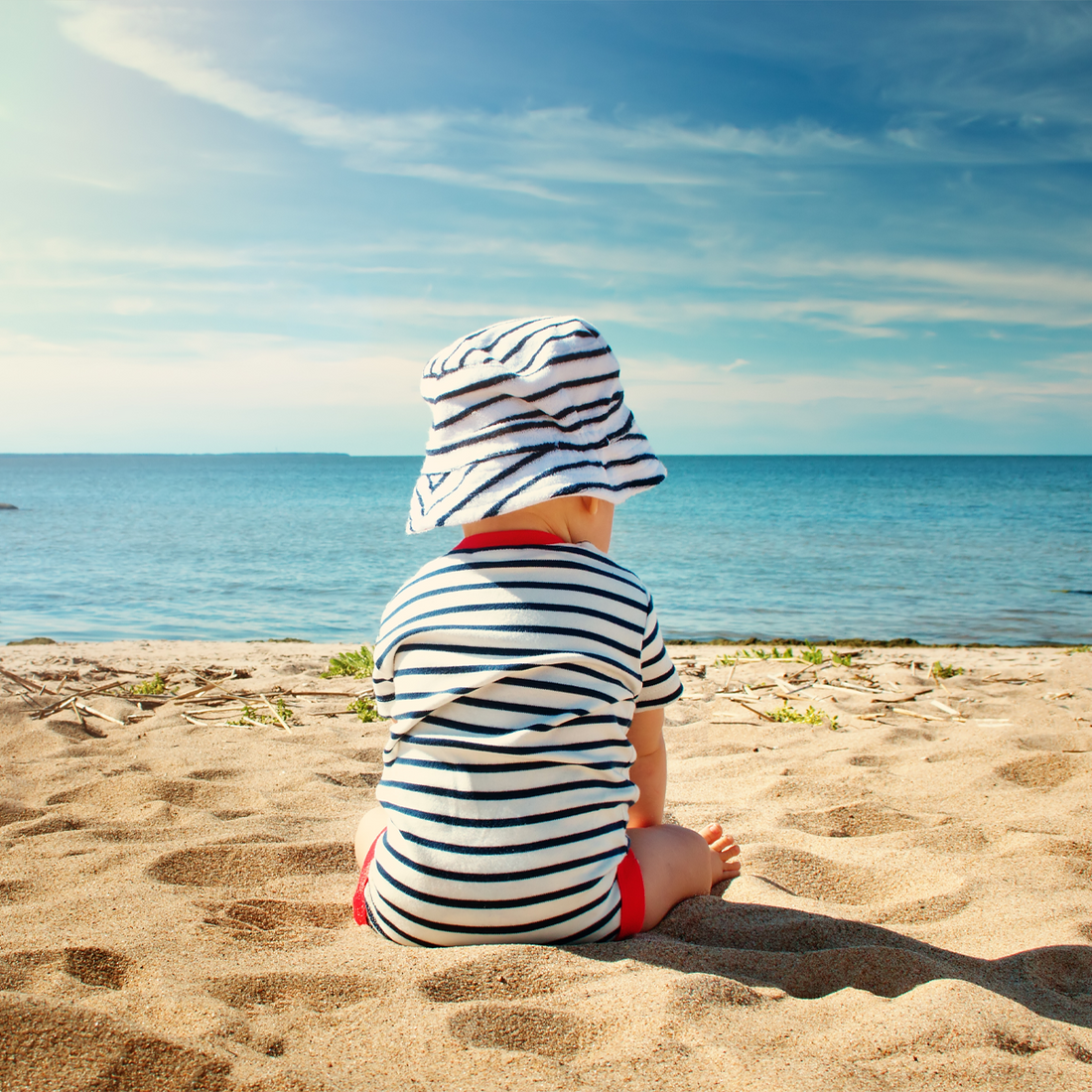
10 Essential Tips for Beach Days with a Newborn
Share
Heading to the beach with a newborn might seem daunting, but don’t worry, mama—we’ve got you covered! With a bit of planning and the right essentials, you can turn a logistical challenge into a tranquil beach day you and your little one will cherish.
From sunshades to baby-friendly sunscreen, we'll help you pack everything you need. Ready to dive in? Let’s jump into our top tips and make your beach outing worthwhile!
Tips To Keep Your Beach Day Smooth Your Newborn
Here are ten essential tips to ensure your beach day with your newborn is as smooth and pleasant as possible!
1. Choose the Right Time to Visit
To protect your newborn from the harsh sun, plan your beach visits during the cooler times of day, either early in the morning or late in the afternoon.
These times offer a more gentle environment for your little one and help you avoid the peak sun hours, reducing the risk of overheating and sunburn.
Moreover, the beach tends to be less crowded during these times, providing a quieter setting that’s perfect for a newborn's sensitive ears.
2. Pack the Essentials
A well-prepared diaper bag is key for a successful beach outing. But what should you 'specifically' place inside?
For your newborn’s first beach day, you should pack essentials that cater to comfort, protection, and convenience. Key items include:
- Diapers and wipes: Enough for several changes throughout the day.
- Clothing: Bring extra outfits, swimwear if appropriate, and a wide-brimmed sun hat.
- Sun protection: A baby-safe sunscreen to apply regularly, and a portable beach tent or umbrella for shade.
- Feeding supplies: Ensure you have all necessary supplies, including a nursing cover for privacy if desired, and extra water for both you and the baby.
- Comfort items: A favorite toy, pacifier, and blanket to help soothe and entertain your baby.
- First aid kit: Include baby-friendly products in case of minor scrapes or irritation.
With these essentials, it's safe to say that you and your baby are good all the way!
3. Sun Protection for Your Baby
Even if you plan to stay in the shade, it’s crucial to maintain a baby skincare with a mineral-based sunscreen suitable for infants. Remember to dress your baby in light, breathable fabrics that cover their arms and legs.

UV-protective clothing can offer additional peace of mind, shielding your baby's sensitive skin from harmful rays. Reapply sunscreen periodically, especially if your baby comes into contact with water or if you towel them off after feeding.
Here are other ways how you can shield them effectively:
- Stay under a canopy or umbrella: To create a safe, shaded area, use a UV-protective portable beach tent or a large umbrella.
- Use baby-specific sunscreen: As we said, apply a broad-spectrum sunscreen suitable for infants, and reapply every two hours or after your baby gets wet.
- Plan around the sun: Avoid beach time during peak sun intensity hours (10 AM to 4 PM). Early morning or late afternoon are the safest times for your baby.
4. Hydration and Comfort
Hydration is essential at the beach, especially for newborns. If you are breastfeeding, you might find yourself needing to nurse more frequently due to the warm environment.
For babies who are formula-fed, bring pre-boiled water to mix feeds and keep everything cool in an insulated bag. Ensure you also stay hydrated to maintain your energy levels and milk production if breastfeeding.
5. Setting Up a Safe Beach Spot
Invest in a portable beach tent or an umbrella that offers UV protection to create a safe, shaded area for your baby. This space can serve as a comfortable spot for your baby to sleep, feed, and play, away from direct sunlight and wind.
You may also want to consider a small, inflatable pool that can be filled with a little ocean water for your baby to enjoy under supervision, mimicking the refreshing feel of the sea in a controlled environment.
Lastly, don't forget to bring a maternity pillow for extra comfort while you're nursing or just relaxing on the beach. This can make feeding sessions more comfortable and offer you much-needed support during the day.
6. Limit Your Time
When bringing a newborn, keep your beach visits brief. A couple of hours is ample time to enjoy the environment without overwhelming your baby. Shorter visits also make it easier to manage feeding and changing without disrupting your baby’s routine too much. See our time recommendation in the #3!
7. Be Mindful of the Temperature
Always check the temperature of the sand and water before letting your baby come into contact with them. Newborns are particularly sensitive to extreme heat and cold, so it’s important to ensure everything is comfortably warm without being hot.

A simple touch test with the back of your hand can be effective in judging whether the sand or water might be too hot or too cold for your baby’s skin. Remember to:
- Monitor for signs of discomfort: Pay close attention to your baby’s cues. Fussiness, crying, or restlessness can indicate that the baby is either too hot, overstimulated or needs a change.
- Avoid overheating: Keep your visit short to prevent your baby from getting too hot, which is a risk during longer exposures to warm environments.
- Adapt to your baby’s routine: Try to align beach time with your baby’s nap schedule to maintain their regular sleep routine, and be prepared to leave earlier than planned if your baby seems tired or overwhelmed.
8. Align Beach Time with Nap Time
If possible, schedule your beach outings around your baby’s nap times. The natural sounds of the sea can soothe a baby to sleep. Bring along a portable bassinet or a cozy, padded blanket where your baby can nap safely.
If your baby is used to white noise, the rhythmic sounds of the ocean can replicate this, helping them to sleep more soundly even in a new environment.
9. Capture the Memories
Bring a camera or your smartphone to capture these special moments. Photos of your baby’s first experiences at the beach are precious keepsakes that you’ll cherish for years to come.
10. Always Be Prepared to Leave
When you’re at the beach with a newborn, always be ready for a swift departure. Whether due to a diaper blowout, sudden weather change, or a fussy baby, having an exit plan can help you manage any situation calmly and efficiently.
Before You Go…
Visiting the beach with a newborn is a wonderful way to experience the outdoors together. With these tips, you can ensure that both you and your baby have a safe, comfortable, and enjoyable day at the sea.
Remember, each trip is a learning experience, so take it slow and enjoy these precious moments in the sun with your little one. What's your thoughts on this post? Let our team Bupsy know!
